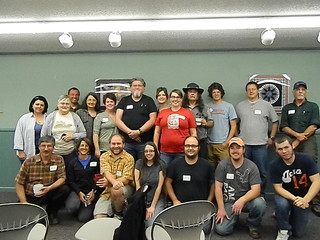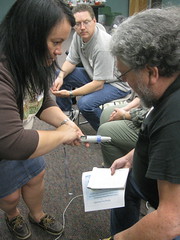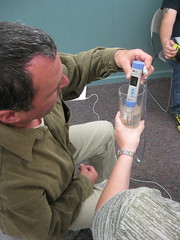H2O-rganizing Trainings Get Underway
About 20 KFTC members from 10 counties met in Prestonsburg last week for a training about ways to use community organizing and community science to enforce the Clean Water Act and protect the health of their communities.
"Knowledge is power," noted one participant from Magoffin County. "Water testing is a good way to get other people involved. To be honest, lots of people don't pay much attention to so-called experts. But information they get from their neighbors holds more water."
At the end of the workshop each participant took home a wand they can use to take basic, important measurements of stream health. These particular meters measure three things: temperature, conductivity and Total Dissolved Solids (TDS). As one participant explained, measuring the conductivity and TDS levels of a stream is a bit like taking a person's temperature. The results provide a good indication if the person, or in this case the stream, is sick. Then additional tests are needed to learn more about the cause and exact nature of the problem.
The US Environmental Protection Agency considers a stream to be severely impaired and unable to support aquatic life if the conductivity is above 500 (measured in units called microsiemens). Healthy Appalachian stream generally have conductivity levels between 200 and 300. In comparison, Floyd County KFTC member Rick Handshoe recently recorded a conductivity reading above 4,000 in a polluted creek behind his home.
Throughout the day, participants also learned about key principles and practices of community organizing. They discussed tips for having good conversations, developing strategy, and communicating publicly about water quality concerns. Before heading home, members developed plans for which streams they would test and ways to educate and involve other people. The full group plans to come back together again in August to share experiences and continue learning.
The training was the first of many that KFTC plans to offer to our members as part of a larger Community Science and Public Health project. Many thanks to our ally organizations Appalachian Voices and Sierra Club, who contributed valuable technical information and equipment.
Recent News
Kentucky’s past legislative session showed alarming trend toward government secrecy
Churchill Downs takes more than it gives. That's why the Kentucky Derby is a no-go for me
‘We must never forget.’ Kentucky town installs markers for lynching victims.
Featured Posts
Protecting the Earth
TJC Rolling Out The Vote Tour – a KFTC Reflection Essay
KFTC Voter Empowerment Contractor Reflection Essay
Archives
- Home
- |
- Sitemap
- |
- Get Involved
- |
- Privacy Policy
- |
- Press
- |
- About
- |
- Bill Tracker
- |
- Contact
- |
- Links
- |
- RSS






Add new comment